Main menu
Common skin conditions

NEWS
Join DermNet PRO
Read more
Quick links
Topical retinoids — extra information
Topical retinoids
Authors: Created 1997; Updated: Dr Sashika Samaranayaka, Post Graduate Year 1, Department of Dermatology, Middlemore Hospital, Auckland, New Zealand; Hon Assoc Prof Paul Jarrett, Dermatologist, Clinical Head Dermatology, Middlemore Hospital and Department of Medicine, The University of Auckland, Auckland, New Zealand. Copy edited by Gus Mitchell. July 2021
Introduction
Uses
Contraindications and precautions
More information
Benefits
Disadvantages
Side effects and risks
What are topical retinoids?
Topical retinoids are medications derived from vitamin A formulated as a cream, lotion, foam, emulsion, or gel.
What are topical retinoids used for?
Topical adapalene, isotretinoin, tretinoin, trifarotene
-
Acne vulgaris and its complications
Applied to the face once daily at bedtime, topical retinoids such as adapalene, isotretinoin, tretinoin (retinoic acid), and trifarotene can help mild to moderately severe acne. They are effective first-line treatment for comedonal and inflammatory acne, but are not recommended as monotherapy for severe acne, especially if there are pustules with deep nodules and cysts. It may take 12 weeks or longer before improvement is seen.
Topical retinoids may reduce the severity of existing scarring and subsequent acne scarring.
Inflammatory dermatoses including acne vulgaris may resolve with postinflammatory hyperpigmentation particularly in skin of colour. Topical retinoids are useful to treat post-inflammatory hyperpigmentation as they inhibit melanosome transfer and facilitate melanin dispersal. They are particularly recommended for the treatment of acne in skin of colour.
Topical retinoids can be used to treat facial acne
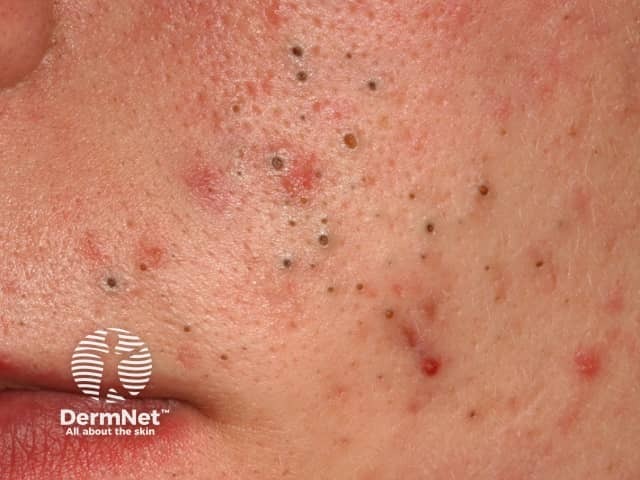
Comedonal acne
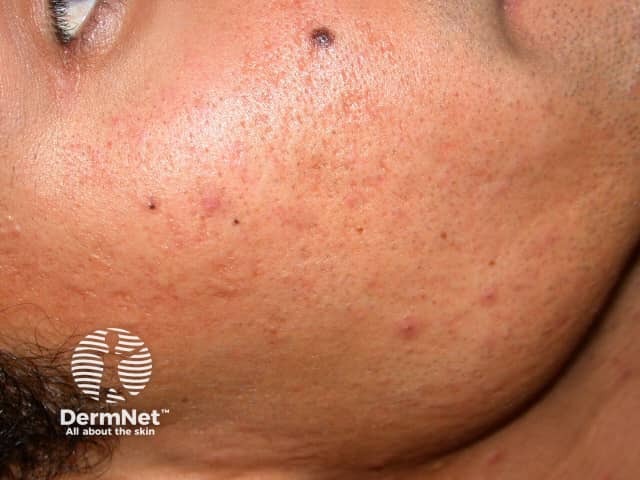
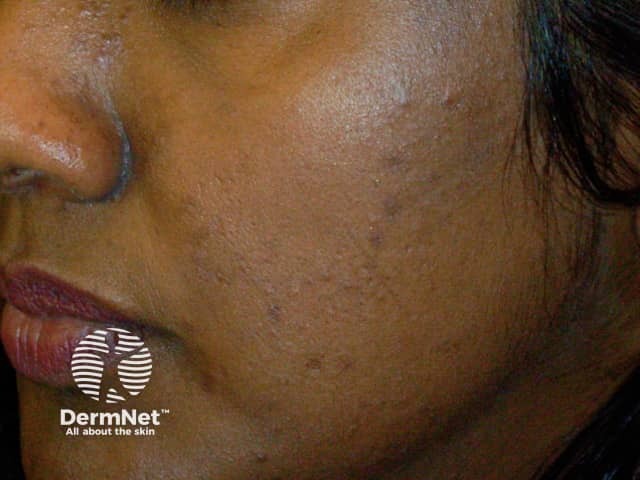
-
Photodamage and photoageing
If used longterm (>6 months) topical tretinoin can reduce freckling, solar lentigines, fine wrinkling, solar comedones, sun-induced skin fragility, and actinic keratoses [see also Skin ageing].
-
Melasma
Topical tretinoin may be combined with other active ingredients in skin bleaching cream to treat melasma.
-
Darier disease and others
Topical isotretinoin, tretinoin, and adapelene have been used for localised Darier disease, reporting significant clinical improvement in symptoms. Topical retinoids may be used to treat many dermatoses - see the list of page links below (On DermNet).
Other topical retinoids used in dermatology
Alitretinoin
- Kaposi sarcoma — FDA approved for localised HIV-related disease
Bexarotene
Tazarotene
- Facial acne
- Postinflammatory hyperpigmentation in dark skin
- Chronic plaque psoriasis
- Photodamage
Trifarotene
- Congenital ichthyosis including recessive X-linked ichthyosis, epidermolytic ichthyosis, and erythrokeratoderma variabilis.
- Trifarotene is approved for the treatment of lamellar ichthyosis by the FDA in the US.
Skin conditions that may be treated with topical retinoids
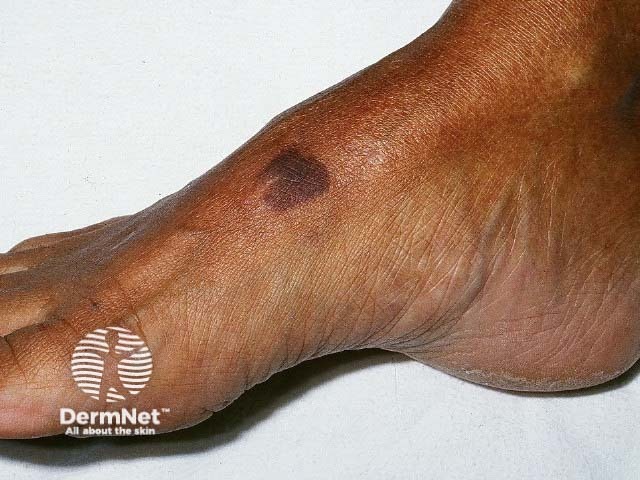
Localised Kaposi sarcoma
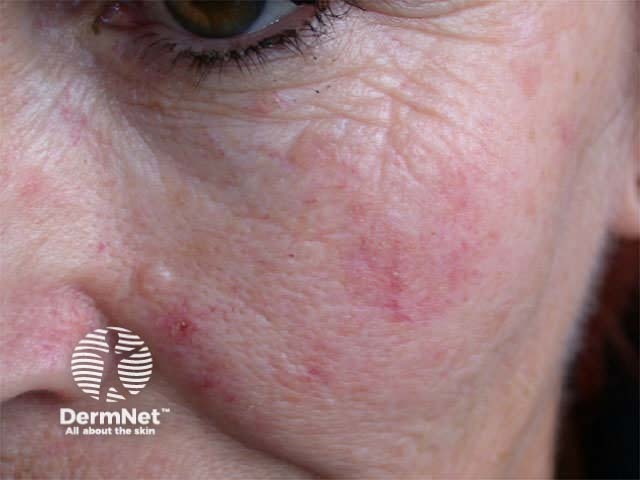
Photodamage and fine wrinkling
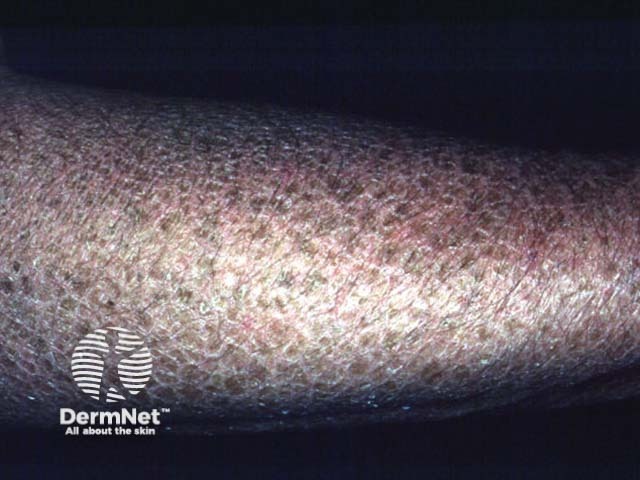
X-linked recessive ichthyosis
What are the contraindications and precautions with topical retinoids?
Contraindications
- Hypersensitivity or allergy to retinoids or excipients
- Some topical retinoids are contraindicated for use in pregnancy
Precautions
- Topical retinoids can make eczema worse because of their drying effect
- Topical retinoids can cause photosensitivity
- Percutaneous absorption of topical retinoids is limited. However, women of childbearing age must use effective contraception due to the teratogenic effects of retinoids.
- Topical retinoids are generally not recommended for use by young children - varies between countries and specific product
Dryness due to a topical retinoid

Dryness due to a topical retinoid
Tell me more about topical retinoids.
Retinoids act at a cellular level. They activate genes involved in the physiology of keratinocytes by binding to specific nuclear receptors, retinoic acid receptor (RAR) and retinoid X receptor (RXR).
Topical retinoids such as retinol and retinaldehyde are commonly added to cosmetics.
Prescribed topical retinoids include adapalene, alitretinoin, tazarotene, tretinoin, and trifarotene. They come in a variety of formulations. Gels are the least cosmetically noticeable; creams are the least irritating. Applying them at night (or just before sleep) mean they are less noticeable when treating the face. The regular application of a sunscreen/moisturiser combination during the day will protect against the sun sensitivity and dryness.
Retinoids can be classified as:
- First generation
- Isotretinoin, tretinoin, and alitretinoin are modifications of natural retinoids which do not act selectively
- Second generation
- Acitretin is an oral retinoid in which a benzene ring is replaced by a cyclohexane ring
- Third generation
- Adapalene, tazarotene, and bexarotene are polyaromatic retinoids with selective activity for the retinoid receptors
- Fourth generation
- Trifarotene is highly specific for the skin retinoid (RAR-γ) receptor
What are the benefits of topical retinoids?
- Favourable safety profile and avoid the systemic side effects of oral retinoids
- Effective for mild comedonal and mild papulopustular acne
- Can be used for ongoing treatment of acne after a course of oral isotretinoin
- Can reverse some of the features of photoageing, photodamage, and improve postinflammatory hyperpigmentation
- Can enhance the efficacy of other topical medications applied such as 5-fluorouracil cream for actinic keratoses or intraepidermal carcinoma, or hydroquinone in bleaching cream.
What are the disadvantages of topical retinoids?
- Not suitable to treat large areas of the body such as extensive acne over the back or chest
- Can be irritating if applied close to the eyes or lips. Adapalene is the least irritating topical retinoid, and tretinoin the most.
What are the side effects and risks of topical retinoids?
- Retinoid dermatitis (erythema, peeling, dry skin)
- Irritant contact dermatitis
- Sun sensitivity
- Allergic contact dermatitis (rare)
- Teratogenic — potential risk in pregnancy particularly with widespread tazarotene use (pregnancy category X in US)
Approved datasheets are the official source of information for medicines, including approved uses, doses, and safety information. Check the individual datasheet in your country for information about medicines.
We suggest you refer to your national drug approval agency such as the Australian Therapeutic Goods Administration (TGA), US Food and Drug Administration (FDA), UK Medicines and Healthcare products regulatory agency (MHRA) / emc, and NZ Medsafe, or a national or state-approved formulary eg, the New Zealand Formulary (NZF) and New Zealand Formulary for Children (NZFC) and the British National Formulary (BNF) and British National Formulary for Children (BNFC).
Bibliography
- Cheng C, Michaels J, Scheinfeld N. Alitretinoin: a comprehensive review. Expert Opin Investig Drugs. 2008;17(3):437–43. doi:10.1517/13543784.17.3.437. PubMed
- Cosio T, Di Prete M, Gaziano R, et al. Trifarotene: a current review and perspectives in dermatology. Biomedicines. 2021;9(3):237. doi:10.3390/biomedicines9030237. Journal
- Kaplan YC, Ozsarfati J, Etwel F, Nickel C, Nulman I, Koren G. Pregnancy outcomes following first-trimester exposure to topical retinoids: a systematic review and meta-analysis. Br J Dermatol. 2015;173(5):1132–41. doi:10.1111/bjd.14053. PubMed
- Ortonne JP. Retinoid therapy of pigmentary disorders. Dermatol Ther. 2006;19(5):280–8. doi:10.1111/j.1529-8019.2006.00085.x. PubMed
- Poon F, Kang S, Chien AL. Mechanisms and treatments of photoaging. Photodermatol Photoimmunol Photomed. 2015;31(2):65–74. doi:10.1111/phpp.12145. Journal
- Querfeld C, Nagelli LV, Rosen ST, Kuzel TM, Guitart J. Bexarotene in the treatment of cutaneous T-cell lymphoma. Expert Opin Pharmacother. 2006;7(7):907–15. doi:10.1517/14656566.7.7.907. PubMed
- Rusu A, Tanase C, Pascu GA, Todoran N. Recent advances regarding the therapeutic potential of adapalene. Pharmaceuticals (Basel). 2020;13(9):217. doi:10.3390/ph13090217. Journal
- Talpur R, Cox K, Duvic M. Efficacy and safety of topical tazarotene: a review. Expert Opin Drug Metab Toxicol. 2009;5(2):195–210. doi:10.1517/17425250902721250. PubMed
- Tan J, Tanghetti E, Baldwin H, Stein Gold L, Lain E. The role of topical retinoids in prevention and treatment of atrophic acne scarring: understanding the importance of early effective treatment. J Drugs Dermatol. 2019;18(3):255–60. PubMed
- Zaenglein AL, Levy ML, Stefanko NS, et al. Consensus recommendations for the use of retinoids in ichthyosis and other disorders of cornification in children and adolescents. Pediatr Dermatol. 2021;38(1):164–80. doi:10.1111/pde.14408. Journal
On DermNet
- Acanthosis nigricans
- Acne in children
- Acne treatment
- Acne vulgaris
- Actinic keratosis
- Adult acne
- Alitretinoin
- Bexarotene
- Bleaching cream
- Comedonal acne
- Confluent and reticulated papillomatosis
- Darier disease
- Enlarged pores
- Facial rejuvenation
- Facial lines and wrinkles
- Flegel disease
- Guidelines for the management of psoriasis
- Keratosis pilaris
- Key clinical trial evidence for alitretinoin
- Lentigo
- Lichen spinulosus
- Milium
- Oral retinoids
- Palmoplantar keratoderma
- Poikiloderma of Civatte
- Recessive X-linked ichthyosis
- Seborrhoea
- Skin ageing
- Stretch marks
- Sunscreens
- Topical treatment for acne
- Treatment of psoriasis
- Trichostasis spinulosa
Other websites
- Topical retinoids — All about acne (Australia)
- Topical retinoids — Medsafe New Zealand
- Acne — Health Navigator New Zealand
- How to treat acne — Best Practice Advocacy Centre
